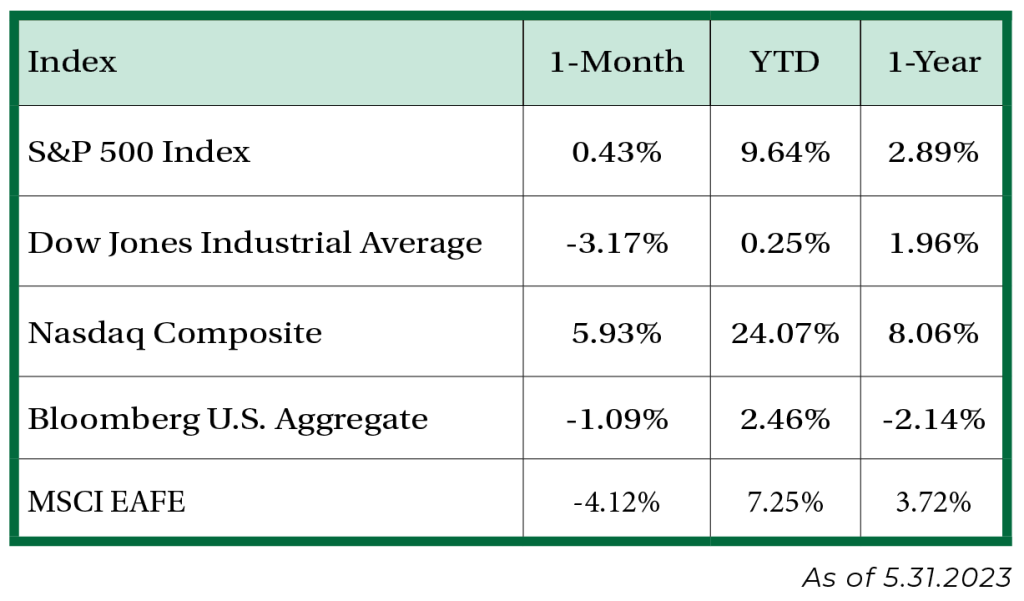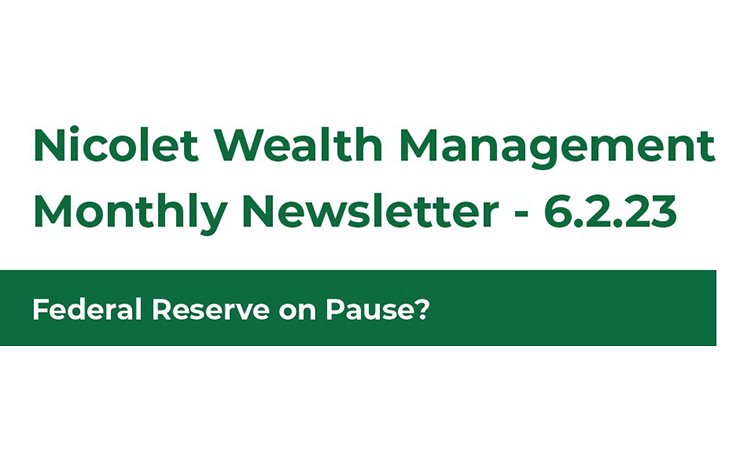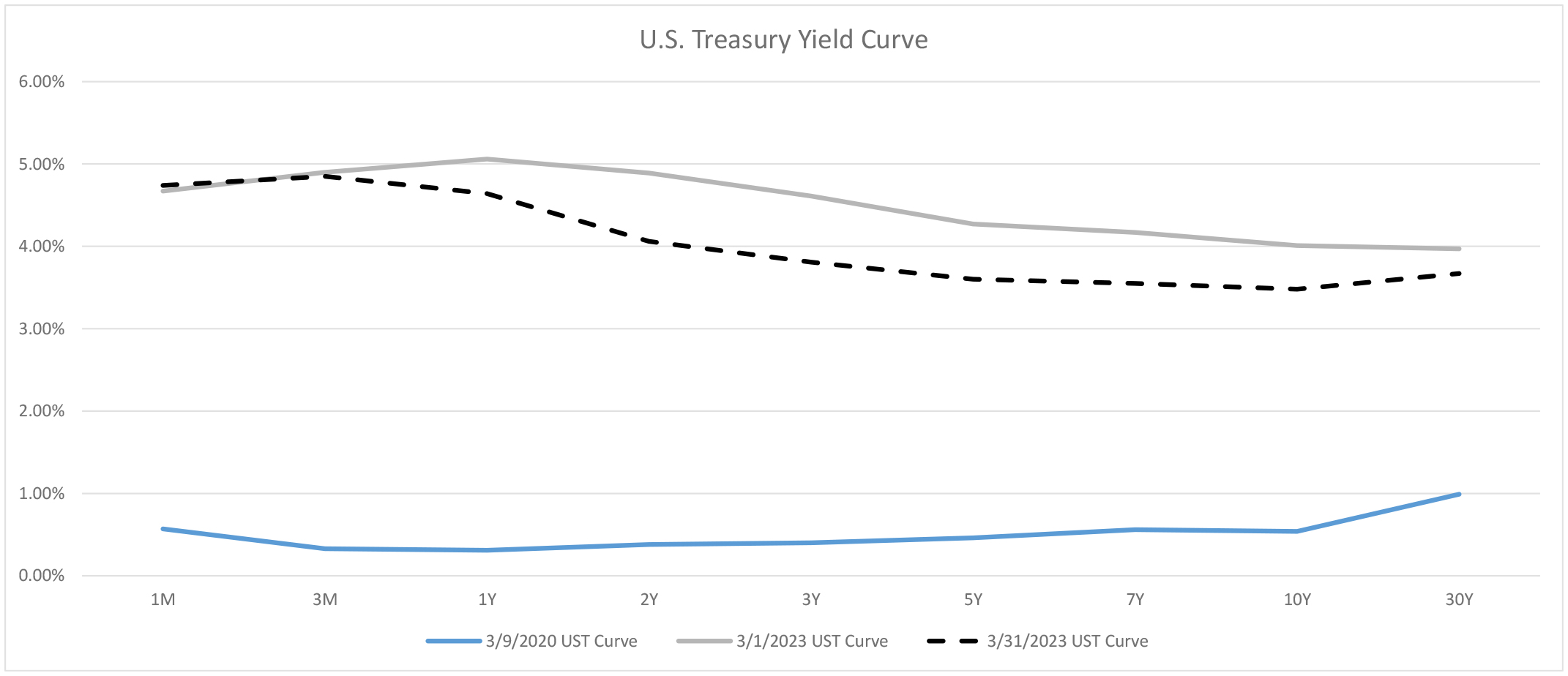Nicolet Wealth Management Monthly Newsletter – 6.2.23
Federal Reserve (Fed) hiked rates by 0.25% to a level of 5.00%-5.25% in early May.
The investment community widely expected the Fed’s May announcement to be the last rate increase of this cycle, but that has changed in recent weeks. What caused this pivot in expectations? Consumer prices in some segments of the economy remain elevated. Particularly, labor-intensive services sectors are contributing to elevated price levels, as they are difficult to control purely through the Fed’s vast toolkit. This is important because controlling consumers’ expectations of prices is a tough battle. For example, if you notice your monthly haircut or oil change rise in price, it’s only human nature to think other segments of the economy are experiencing the same conditions. As a result, consumers look to expedite the purchases of furniture or a new laptop, fearful prices might rise in the near future. So far, the Fed has tried to manage these expectations, but recent surveys indicate elevated inflation. Surveys performed by the University of Michigan show inflation expectations for 1 year and 5-10 years remaining above the Fed’s target of 2%. Until prices are controlled, rate hikes could be on the table.
Housing.
Whether you’re a homeowner or renter, the trajectory of housing is an important economic factor. The Fed can control the interest-rate sensitive housing market to some degree. Largely in reaction to the Fed’s rate hikes pushing the 30-year average mortgage rate above 7% and causing the average mortgage payment to increase about 85% since 2020, per the National Association of Realtors, the yearly change in home prices has fallen to its lowest level since 2012. While higher rates have cooled activity with housing starts down 22% from the peak set in April 2022, there appear to be signs of improvement. For example, the National Association of Home Builders (NAHB) Index, a representation of builder confidence, has turned surprisingly/sharply to a neutral level after falling to its lowest level since 2020. While real data have yet to confirm the NAHB Index, some data are beginning to show near-term improvement.
Equity Markets Led by Technology.
Equity indices moved on divergent paths the past month, led by the technology-heavy Nasdaq, advancing 5.93%, while the S&P 500 index returned 0.43% and the Dow Jones Industrial Average declined -3.17%. In fact, year-to-date performance has similar trends. Not only has the Nasdaq led all U.S. indices, but the top 5 performing stocks in the S&P 500 index are all Nasdaq members. These same top 5 performing equities have contributed about 80% of returns in the S&P 500 index year-to-date. This market has been extremely concentrated with very few stocks contributing to the upside. A few reasons can explain the Nasdaq’s performance. First, the market’s expectation for Fed rate hikes have been curbed to start the year. Second, there’s been excitement around Artificial Intelligence (AI). Third, the technology valuation is relatively reasonable. A cheap valuation contributing to performance can be explained in the context of household purchases. When a product becomes cheap enough, and all other factors remain supportive, it is likely that product will be in higher demand.
Better-Than-Expected 1st Quarter Earnings Season.
Sometimes market sentiment can intensify headlines. This is exactly what occurred going into 2023. Companies took a pragmatic approach heading into the year by cutting earnings estimates given the challenging environment and their share prices reflected the weaker earnings profile. By doing so, the earnings hurdle was much lower to surpass if data were to surprise to the upside. Almost every single sector surpassed earnings and sales growth estimates! However, looking beyond 1st quarter earnings, full-year earnings have not been revised higher, suggesting an uncertain outlook. Investors’ moods are turning increasingly sanguine as of late, given the better-than-expected earnings results.
Higher Interest Rates Reflecting Stronger Growth Prospects.
Longer-term interest rates drifted higher in May as investors tried to balance the debt ceiling and improved growth prospects. The 10-year Treasury yield ended the month at 3.64%, a level last touched in March when bank uncertainty initially hit the headlines. Short-term interest rates fluctuated due to the debt ceiling negotiations and the market pricing in one more Fed Funds rate hike in 2023, with the 1-month U.S. Treasury yield jumping to 5.62% after starting the month at 4.08%! The upward move in rates was reflected in May performance of the Bloomberg U.S. Aggregate Index (a broad representation of the bond market), which dropped -1.09% on bond prices adjusting lower.

Although we believe it to be reliable as of the publication date and have sought to take reasonable care in its preparation, all information provided is FOR INFORMATIONAL PURPOSES ONLY and we make no representations or warranties regarding its accuracy, reliability, or completeness and assume no duty to make any updates in the event of future changes. Past performance may not be indicative of future market results. Any examples used (including specific securities) are generic and meant for illustration purposes only and are not, and should not be interpreted as, offers to buy or sell such securities. To the extent indices are referenced, please note that you are not able to invest directly in an index.
Nicolet Wealth Management is a brand name that refers to Nicolet National Bank and certain of its departments and affiliates that provide investment advisory, trust, retirement planning and insurance services. Investment advisory services offered through Nicolet Advisory Services, LLC (dba Nicolet Wealth Management), a registered investment advisor.
All investments are subject to risks, including possible loss of principal, and are: NOT FDIC INSURED; NOT INSURED BY ANY FEDERAL GOVERNMENT AGENCY; AND NEITHER DEPOSITS OR OTHER OBLIGATIONS OF, NOR GUARANTEED BY, Nicolet National Bank or any of its affiliates. Neither Nicolet Advisory Services nor its affiliates offer tax or legal advice. You should consult with your legal and tax professionals before making investment decisions.









